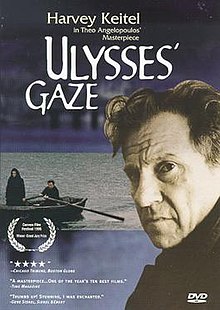fiction.wikisort.org - Movie
Ulysses' Gaze (Greek: Το βλέμμα του Οδυσσέα, translit. To Vlemma tou Odyssea) is a 1995 Greek film directed by Theo Angelopoulos and starring Harvey Keitel, Maia Morgenstern, and Erland Josephson. The film was selected as the Greek entry for the Best Foreign Language Film at the 68th Academy Awards but it was not nominated.[1][2]
| Ulysses' Gaze | |
|---|---|
 Ulysses' Gaze DVD cover | |
| Directed by | Theo Angelopoulos |
| Written by | Theo Angelopoulos Tonino Guerra Petros Markaris Giorgio Silvagni Kain Tsitseli |
| Produced by | Phoebe Economopoulos Eric Heumann Giorgio Silvagni |
| Starring | Harvey Keitel Maia Morgenstern Erland Josephson |
| Cinematography | Giorgos Arvanitis |
| Music by | Eleni Karaindrou |
| Distributed by | Roissy Films |
Release date |
|
Running time | 176 minutes |
| Country | Greece |
| Languages | English Greek |
Plot
Successful Greek filmmaker, A (Harvey Keitel), returns to Greece. He has come to participate in a screening of one of his earlier films and to begin a personal journey across the Balkans. After the screening is disrupted by local ideological conflict, A takes a taxi from Greece to Albania. Ostensibly A is searching for 3 undeveloped reels of film shot by the Manaki brothers. The mysterious reels could predate the brother's first film, The Weavers, which is believed to be the first film shot in the Balkans.
A's journey fuses his own memories, the experiences of the Manaki brothers, and contemporary images of the Balkans. A drifts from Albania to North Macedonia, Bulgaria, Romania and Serbia. He travels on a train, a barge laden with a statue of Lenin (Polyphemus) and eventually a row boat. Though A makes some acquaintances along the way, he never lingers. His search for the roots of cinema, memory, and the Balkan identity pull him inevitably towards decay and death.
A eventually travels to the besieged Sarajevo. He meets Ivo Levy (Erland Josephson), the curator of an underground cinema archive who had attempted to develop the missing reels before the war. A convinces Levy to continue his work with the reels. The film ends on a rare foggy day in Sarajevo. Ironically the fog protects locals from snipers and gives the city a rare chance to flourish. A explores the city with Levy's family. Near the river the family encounters military personnel and are executed.
Cast
- Harvey Keitel as A
- Maia Morgenstern as Woman In A's Home Town (Penelope) / Kali (Calypso) / Widow (Circe) / Naomi (Nausicaa)
- Erland Josephson as Ivo Levy
- Thanassis Veggos as Taxi Driver
- Yorgos Michalakopoulos as Nikos
- Dora Volanaki as The Old Lady In Albania
- Mania Papadimitriou as A's Mother
Production
The film is part of Angelopoulos's trilogy on borders. It was his first film made outside of Greece. The film screening at the beginning of the film was inspired by a screening of Angelopoulos's earlier film The Suspended Step of the Stork. The dialog played over loudspeakers in the town square was spoken by Marcello Mastroianni[3]
The actor Gian Maria Volonté died during the filming. He was replaced by Erland Josephson and the film was dedicated to Volonté's memory.
Soundtrack
The score by Eleni Karaindrou featuring Kim Kashkashian on viola was released on the ECM label in 1995.
Accolades
- Grand Jury Prize - 1995 Cannes Film Festival[4]
- Critics Award 1995 - European Film Academy
- All-TIME 100 Movies - TIME magazine[5]
- The Top 100 Films of All Time - The Moving Arts Film Journal[6]
See also
- List of submissions to the 68th Academy Awards for Best Foreign Language Film
- List of Greek submissions for the Academy Award for Best Foreign Language Film
References
- Margaret Herrick Library, Academy of Motion Picture Arts and Sciences
- "41 to Compete for Foreign Language Oscar Nominations". FilmFestivals.com. Archived from the original on April 7, 2012. Retrieved 4 October 2015.
- Portuges, Catherine (October 1996). "Review of Ulysses' Gaze". The American Historical Review. 101 (4): 1158–1159. doi:10.2307/2169647. JSTOR 2169647.
- "Festival de Cannes: Ulysses' Gaze". festival-cannes.com. Retrieved 2009-09-05.
- "All-TIME 100 Movies". Time. ISSN 0040-781X. Retrieved 2017-12-24.
- "Check Out TMA'S 100 Greatest Movies Of All Time List". GeekTyrant. Retrieved 2017-12-24.
External links
- Ulysses' Gaze at IMDb
- Ulysses' Gaze at AllMovie
- Ulysses' Gaze at Discogs (list of releases)
- Ulysses' Gaze at Rotten Tomatoes
- Ulysses' Gaze (1995) TIME Magazine All-Time 100 best films
На других языках
[de] Der Blick des Odysseus
Der Blick des Odysseus (Originaltitel: Το βλέμμα του Οδυσσέα) ist ein Filmdrama des griechischen Filmemachers Theo Angelopoulos aus dem Jahre 1995.- [en] Ulysses' Gaze
[es] La mirada de Ulises
La mirada de Ulises es una película griega dirigida por Theo Angelopoulos en el año 1995.[1][ru] Взгляд Улисса
«Взгляд Улисса» (греч. Το Βλέμμα του Οδυσσέα, фр. Le Regard d'Ulysse) — кинофильм Тео Ангелопулоса. Получил Гран-при Каннского кинофестиваля 1995 года. Входит в список ста величайших фильмов по версии журнала Тайм[1].Другой контент может иметь иную лицензию. Перед использованием материалов сайта WikiSort.org внимательно изучите правила лицензирования конкретных элементов наполнения сайта.
WikiSort.org - проект по пересортировке и дополнению контента Википедии